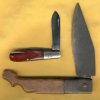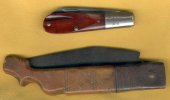- Joined
- Mar 28, 2015
- Messages
- 726
Posted this before, I think in reply to another thread. Anyway, don't think it was widely read..
There was a time when every man in England, America and most of the Western World carried a pocket knife. Until very recently in fact every man from office clerk to farm labourer carried a folding knife of one form or another. Theirs was the refinement of a tradition leading back hundreds if not thousands of years of the small fixed blade, used for minor cutting tasks, food preparation, eating etc. For the farm labourer the spay blade of his stockman would be used for its intended purpose and its drop-point for the eating of an apple within the same half an hour, with little more than a quick rinse in the horse trough between. In his book The Ragged Trousered Philanthropists Robert Noonan describes how his chief protagonist and socialist Frank Owen urges his workmates to produce their pocket knives, and uses them as a metaphor by which to explain the capitalist system under which they are said to be the victims. The knives are the ‘machine’ by which the bread is divided and the capitalist ‘money trick’ is performed. Every man amongst the bedraggled workforce produces his knife, though at this time (around 1910) and as the book graphically describes, God knows they had little else. The folding knife was an essential, useful and highly valued item to the working man.
And so the same knife, used for the sharpening of a pencil and the cutting of a bit of bread and cheese at lunchtime, stayed in the pocket of the average working man during his leisure. Perhaps whilst fishing his folder would be there for trimming the line and cleaning the catch, or gutting the odd rabbit as a welcome treat for dinner. By the fireside in the evening it might have been used to whittle a small doll or toy as a present for one of the children. I have been lucky enough to have inherited my Grandfather’s pocket knife which he had from his father, as well as those belonging to both of my Great Uncles. For me, with a proud working class history, these knives are full of such wonderful connotations.
There is something else, also, in owning a traditional slip-joint, particularly an inherited one. For most of us our distant ancestry is as hunter, gatherer tribe’s people. As such, a knife or a blade would have had two main functions: as a means to prepare food and as a weapon. Such things, when handed down, would have taken on distinct talismanic qualities, providing a strong and powerful link to the past, a grounding in the present as well as faith and direction for the future. The story of The Sword in the Stone is a good example of how such notions still remain pertinent to us today.
Some might say it is ridiculous to imagine that there might be anything genetic in our appreciation and desire for a good knife. But when you consider that once upon a time a fire and a decent cutting edge were our most vital and valued tools, the control of which enabled us, ultimately, to survive as independent human beings, it becomes quite understandable to think that, somehow, some of that appreciation still resides instinctively within us. As when one feels the pull of that first fish of the season and something indescribable and almost primeval is felt pulling on the line, something from our distant past which I have come to believe pertains to the ancient hunter/survivor in us, so it is when we take up our traditional slip-joints.
When my Great Grandad and my Great Uncles chose their knives they did so on the basis of build quality, fitness for purpose and value for money. For me they got it right, and I personally feel no desire to reinvent the wheel on that one. To go over to anything other than a traditional pattern would feel like breaking with the traditions and the history that I find so pleasing. Every time I use my slip-joint I connect with something both important yet basic...and it feels right.
- Mark
 Untitled by Mark Saunders, on Flickr
Untitled by Mark Saunders, on Flickr
 Untitled by Mark Saunders, on Flickr
Untitled by Mark Saunders, on Flickr
My Grandad's and my Great Uncle's penknives.
There was a time when every man in England, America and most of the Western World carried a pocket knife. Until very recently in fact every man from office clerk to farm labourer carried a folding knife of one form or another. Theirs was the refinement of a tradition leading back hundreds if not thousands of years of the small fixed blade, used for minor cutting tasks, food preparation, eating etc. For the farm labourer the spay blade of his stockman would be used for its intended purpose and its drop-point for the eating of an apple within the same half an hour, with little more than a quick rinse in the horse trough between. In his book The Ragged Trousered Philanthropists Robert Noonan describes how his chief protagonist and socialist Frank Owen urges his workmates to produce their pocket knives, and uses them as a metaphor by which to explain the capitalist system under which they are said to be the victims. The knives are the ‘machine’ by which the bread is divided and the capitalist ‘money trick’ is performed. Every man amongst the bedraggled workforce produces his knife, though at this time (around 1910) and as the book graphically describes, God knows they had little else. The folding knife was an essential, useful and highly valued item to the working man.
And so the same knife, used for the sharpening of a pencil and the cutting of a bit of bread and cheese at lunchtime, stayed in the pocket of the average working man during his leisure. Perhaps whilst fishing his folder would be there for trimming the line and cleaning the catch, or gutting the odd rabbit as a welcome treat for dinner. By the fireside in the evening it might have been used to whittle a small doll or toy as a present for one of the children. I have been lucky enough to have inherited my Grandfather’s pocket knife which he had from his father, as well as those belonging to both of my Great Uncles. For me, with a proud working class history, these knives are full of such wonderful connotations.
There is something else, also, in owning a traditional slip-joint, particularly an inherited one. For most of us our distant ancestry is as hunter, gatherer tribe’s people. As such, a knife or a blade would have had two main functions: as a means to prepare food and as a weapon. Such things, when handed down, would have taken on distinct talismanic qualities, providing a strong and powerful link to the past, a grounding in the present as well as faith and direction for the future. The story of The Sword in the Stone is a good example of how such notions still remain pertinent to us today.
Some might say it is ridiculous to imagine that there might be anything genetic in our appreciation and desire for a good knife. But when you consider that once upon a time a fire and a decent cutting edge were our most vital and valued tools, the control of which enabled us, ultimately, to survive as independent human beings, it becomes quite understandable to think that, somehow, some of that appreciation still resides instinctively within us. As when one feels the pull of that first fish of the season and something indescribable and almost primeval is felt pulling on the line, something from our distant past which I have come to believe pertains to the ancient hunter/survivor in us, so it is when we take up our traditional slip-joints.
When my Great Grandad and my Great Uncles chose their knives they did so on the basis of build quality, fitness for purpose and value for money. For me they got it right, and I personally feel no desire to reinvent the wheel on that one. To go over to anything other than a traditional pattern would feel like breaking with the traditions and the history that I find so pleasing. Every time I use my slip-joint I connect with something both important yet basic...and it feels right.
- Mark
 Untitled by Mark Saunders, on Flickr
Untitled by Mark Saunders, on Flickr Untitled by Mark Saunders, on Flickr
Untitled by Mark Saunders, on FlickrMy Grandad's and my Great Uncle's penknives.
Last edited:

 I think subconsciously we do inherit memories of our past ancestors good and bad, it explains a lot of behaviours
I think subconsciously we do inherit memories of our past ancestors good and bad, it explains a lot of behaviours 
 Untitled
Untitled

